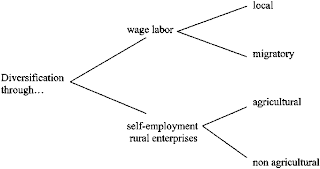- reproduce and enhance the profile of (relatively) small independent farmers;
or
- assuming (at least partially) the connotation of a "semi-proletarian rural wage (De Janvry 1981).
Other distinctions among local and migrant labor and agricultural wages and non-agricultural self-employment are also important to capture the spatial and sectoral diversification of livelihood. This is reflected in the classification of basic alternatives in rural livelihood strategies presented in Figure 1 below.
Figure 1 - Alternative strategies based on diversification of rural
In this classification, wage labor refers to the provision of labor to agricultural enterprises or non-agricultural employers not belonging to the household. Though sometimes the job opportunities are available locally (local employment), in most cases the jobs are spatially distant places of residence and involves seasonal migration or long-term (wage labor migration). If adopted as part of a strategy to diversify rural livelihoods, the two types of paid employment rarely require a full "proletarianization" of rural workers. Rather, as pointed out 20 years ago by Alain de Janvry (1981), remittances from employment of temporary or part-time rural, often complement a production at the farm no longer sufficient to meet the needs of household consumption. Moreover, in some cases, the savings generated through paid work (and, in particular the wage labor migration) can re-capitalize impoverished farms and creating new opportunities for the development of independent
rural business self-employment refers to activities carried out by hand to mobilize more domestic resources for capital (savings, land, etc..) Rural agricultural enterprises are often based on exploitation of innovation in agricultural activities (in the form of commercial production or independent contract farming). On the other hand, non-agricultural rural businesses focus on activities such as processing of agricultural or forestry, trade of small, artisanal manufacturing part by home-based, or delivery of certain services to the community or others. These rural businesses can develop within a single family or involve a wide social network, based on traditional or innovative forms of inter-family. The latter arrangement is particularly important to make the development of viable enterprise for household and individuals in need of capital goods needed to start an activity of self-employment on their own.
Simak
Baca had dried fonetik
